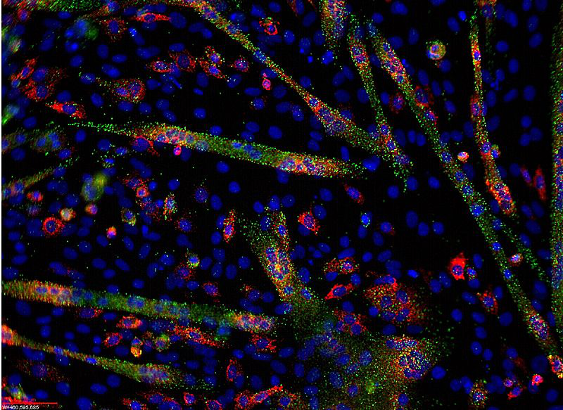After the human genome project was completed, many people were surprised to learn that 98% of genome did not code for any functional genes. However, this ‘junk DNA’ holds surprising secrets, and is actually a hub of crucial gene-controlling activity. So it would make sense that within this hotbed of activity, that there would be certain factors that drive cancer progression.
The study of micro-RNAs – or miRNAs for short – is an exciting and fast-developing area in cancer research. MiRNAs are small non-coding RNAs involved in post-transcriptional regulation, and can have a profound effect on a cell by controlling how many proteins are produced by individual genes. But studying miRNAs poses a significant challenge because their effects cannot be understood simply by looking at the genetic code contained within our DNA.
Dr Nicola Valeri has recently joined The Institute of Cancer Research, London, and is out to find new possible targets for cancer therapy in colon and other gastrointestinal cancers, such as gastro-oesophageal cancer. The team is tapping into the huge potential of using miRNAs for diagnostic and therapeutic applications in cancer. Dr Valeri explains: “We already know that miRNA deregulation is common to most solid and haematological malignancies and has a powerful influence on how cancer progresses. In particularly, miRNA-21 expression is associated with poor prognosis and drug resistance in many cancers. Because they are so stable, miRNAs can be easily detected in tissues and serum from cancer patients, and they make an ideal candidate for cancer diagnosis and therapy.”
In collaboration with Professor David Cunningham at The Royal Marsden, Dr Valeri’s team are currently trying to define the types of miRNAs that are associated with response to chemotherapy and new biological agents patients with colorectal and upper-gastrointestinal cancers. Dr Valeri explains: “New treatments for these cancers are drugs that target neo-angiogenesis – the ability of tumours to form new blood vessels – and those that boost the immune system against cancer – immunotherapies. While these drugs were promising in preclinical and early-phase clinical trials, phase III trials show that these drugs are characterised by important toxicities – such as rashes and diarrhoea – and only a limited proportion of patients tend to respond well. Defining non-invasive methods to predict patients’ response would be an invaluable resource to tailor patient treatment – minimising the risk of unnecessary toxicities, improving patient’s quality of life and saving money for the NHS.”
Colorectal cancer arises through the progressive accumulation of gene mutations. Some of these mutations activate oncogenes, which promote cancer, and others deactivate tumour suppressor genes which help protect the cell against cancer. Targeted therapies against oncogenes, such as BRAF and ALK, are promising but they don’t always work for long periods because of the activation of alternative pathways resulting in resistance. On the other hand, developing treatments that target mutated tumour-suppressor genes such as APC remains a challenge. For these reasons, it makes sense to look for alternative targets, and looking at the downstream effectors of driver genes mutated in cancer may increase the specificity and overcome drug resistance. “We are using large-scale RNAi screenings to define novel targets of therapies according to tumour molecular profile in colorectal cancers,” says Dr Valeri. “RNAi uses small sequences of genetic code that can bind to matching genes to stop them from carrying out their normal function, and each RNAi sequence matches a particular section of a given gene. Using this technology in numerous clinical models – as well as human colorectal cancer tissues – we will be defining coding and non-coding genes associated with KRAS and P53 mutations – two mutations that are common to most human cancers. Ultimately we want to find potential novel targets for drug development in colorectal cancer.”
MiRNAs – these little strands of genetic material once thought to be unimportant – are now proving to be a major player in cancer research. Offering a huge unknown potential, many are now under evaluation in clinical trials to assess if they can be used as diagnostic and prognostic markers, predictors of treatment response, and potential therapeutic targets.
